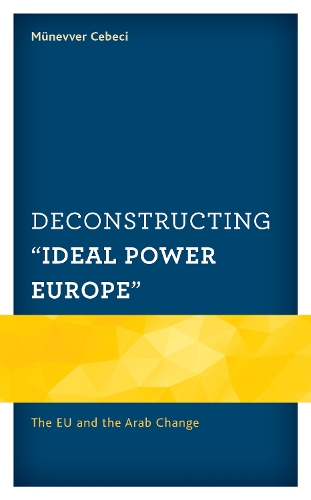
Deconstructing "Ideal Power Europe": The EU and the Arab Change
(Hardback)
Publishing Details
Deconstructing "Ideal Power Europe": The EU and the Arab Change
By (Author) Mnevver Cebeci
Bloomsbury Publishing PLC
Lexington Books
31st December 2018
United States
Classifications
Professional and Scholarly
Non Fiction
Politics and government
327.4
Physical Properties
Hardback
156
Width 156mm, Height 238mm, Spine 18mm
376g
Description
Deconstructing Ideal Power Europe: The EU and Arab Change criticizes the dominant discourse on European foreign policy, which represents the EU as a force for good in world politics. Using a poststructuralist approach, it deconstructs the EUs representation as an ideal power through an analysis of European foreign policy on the Southern Mediterranean before and after the Arab uprisings. In this endeavor, it displaces three major discourses which construct the EU as ideal: the postmodern and post-sovereign EU, the EU as a model/a virtuous example, and, the EU as a normative power discourses. The major argument of the book is that the ideal power Europe meta-narrative is especially produced and reproduced in the EUs approach towards the Southern Mediterranean, and, it manifests itself through the rhetoric of responsibility and universality in the aftermath of the Arab uprisings. The book also provides an analysis of how the ideal power Europe meta-narrative feeds into and legitimizes European governmentality in the world, in general, and, in the case of the Southern Mediterranean after the Arab uprisings, in particular. Arguing that the depiction of the EU as postmodern/post-sovereign, as a model/an exemplar, and as a normative power pertains to the representation of a regulatory ideal, it elucidates how the EU pursues hegemonic practices in the Southern Mediterranean. It further manifests how the EUs governmentality is marked by a securitized, depoliticizing, and technocratic approach which feeds into and gets legitimized by the dominant discourse on European foreign policy; reproducing the EUs ideal identity vis--vis its imperfect Arab other.
Reviews
In this excellent and highly engaging analysis of EU discourses on the Southern Mediterranean, Cebeci masterfully unsettles the comfortable self-appraisals of many EU scholars and practitioners. A sobering must-read for anyone interested in EU foreign policy and EU-Arab relations. -- Thomas Diez, University of Tbingen
At a time when the EU seems to be in search of its role and identity in general and vis--vis its neighbors in particular, Mnevver Cebeci offers a very timely and distinct analysis of the role of discourse in EU foreign policy. By providing a detailed post-structuralist interrogation of how the EU uses discourse and the depiction of itself as post-modern, post-sovereign and normative as tools to construct and reproduce an ideal self and an inferior and imperfect other, she sheds a much welcome light on the de facto legitimizing practices driving the EUs supposedly hegemonic ambitions in the space beyond its territorial borders. Drawing on Foucaults governmentality approach, this insightful study is a stark and much overdue reminder to all European Studies scholars and students alike to look beneath the surface of idealized and idealizing role concepts and EU foreign policy behavior. With this enlightening book, Cebeci puts herself at the forefront of the literature addressing the linkage between EU foreign policy, identity and sovereignty." -- Tobias Schumacher, European Neighbourhood Policy Chairholder, College of Europe, Natolin
In this book Mnevver Cebeci offers a reading of current EU policy towards the Southern Mediterranean that is both critical and original. In contrast to the overwhelming majority of accounts in this field, the book provides a historically conscious account of the EUs current approach to its southern neighborhood. Cebeci debunks a number of tacit assumptions and myths that cloud our understanding of the EUs foreign policy its current orientation, its past record and its future prospects. As she also skilfully shows, these myths are not only perpetuated by the EU organizations itself; they are also the result of a vast scholarship, stuck in an idealized conception of the EU project. -- Peo Hansen, Linkping University
In a world where Europes influence is arguably more necessary than ever, Munevver Cebeci provides us with a precious counterpoint to the dominant analysis on EU foreign policy. The EU may think of itself as an "ideal power, in contrast in particular to its imperfect Arab neighbor, but such is not the secret for effectiveness in a post-colonial world. In the end, says Dr Cebeci, the EU will need to move from its narrow emphasis over security concerns and technocratic recipes to the more robust politics of democratic transformation in the region. -- Kalypso Nicoladis, professor of international relations, University of Oxford
Author Bio
Mnevver Cebeci is associate professor at Marmara University.
